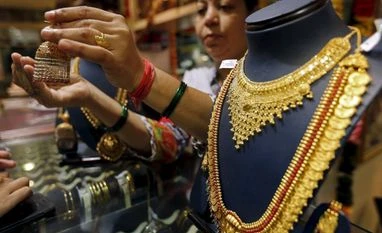Mandatory hallmarking of gold jewellery by Diwali
Govt also could bring import and export of jewellery under one organisation
)
A saleswoman shows a gold earring to customers at a jewellery showroom in Mumbai. Photo: Reuters
The central government will make compulsory the hallmarking of gold jewellery by Diwali. It is also working on other issues regarding the overseeing of the sector. That includes two government representatives joining the board of the apex bullion body, Indian Bullion and Jewellers Association (Ibja), bringing import and export of bullion and gold jewellery under one organisation, and closer monitoring of gold import.
The Bill to amend the Bureau of Indian Standards (BIS) Act has been passed and the changes were formally notified last month. These give, among other things, the government the power to declare that specified goods will need to carry a standard mark, by a date it decides. This will be done, it has been decided, for gold jewellery in the next six months, by Diwali; till now, hallmarking was voluntary. The rules for these would first have to be notified. Discussion is on with the stakeholders concerned.
The Bill to amend the Bureau of Indian Standards (BIS) Act has been passed and the changes were formally notified last month. These give, among other things, the government the power to declare that specified goods will need to carry a standard mark, by a date it decides. This will be done, it has been decided, for gold jewellery in the next six months, by Diwali; till now, hallmarking was voluntary. The rules for these would first have to be notified. Discussion is on with the stakeholders concerned.
BIS says there are 375 hallmarking centres in the country. In a number of states, the number is only one or in single digits. The government is reviewing how well the industry is equipped to handle the additional business, whether there is a need for relaxing the norms for setting up such centres and like issues.
ALSO READ: Gold imports drop 16% in FY16
According to informed sources, 500 tonnes of jewellery were hallmarked in 2014-15. Assuming 10g for each piece of jewellery, that would be 37 million pieces. In south India, where the trade is more organised, it is estimated 65 per cent of jewellery is hallmarked. Of the 375 centres, 161 are in the four major southern states. The rest are almost equally divided between the east, west and north. Sources say the organised nature of the trade in the south, where a large part of jewellery making is on the books, is the main reason for early withdrawal there of the recent strike against central excise duty.
K Anand Kumar, secretary, Indian Association of Hallmarking Centres, said: “The capacity to hallmark gold jewellery is actually underutilised. If the government implements mandatory hallmarking, the industry is equipped.”
As for Ibja, it has a 20-member national board. The constitution has been changed to accommodate a nominee each from the Union commerce and finance ministries. This is supposed to help the government understand the industry’s views and vice versa.
The government is also considering if import of gold for only the domestic market and export of gold jewellery can be overseen by a single body. Currently, private agencies track the former and the Gems and Jewellery Export Promotion Council the latter.
| HALLMARKING |
| When jewellery is hallmarked it means it meets the quality standard, especially carat, which the seller claims according to BIS norms. Hallmarking centres outside jewellery making facilities do quality testing and certify the quality or carat. Each piece of jewellery has to be hallmarked |
More From This Section
Don't miss the most important news and views of the day. Get them on our Telegram channel
First Published: Apr 18 2016 | 10:34 PM IST
